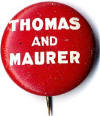 Gathering in Cleveland for its third annual convention, the League for Independent Political Action (LIPA) adopted a comprehensive platform and endorsed the Socialist Party’s Norman M. Thomas for the presidency on this week in 1932.
Gathering in Cleveland for its third annual convention, the League for Independent Political Action (LIPA) adopted a comprehensive platform and endorsed the Socialist Party’s Norman M. Thomas for the presidency on this week in 1932.
Led by the brilliant but rumpled left-wing philosopher John Dewey of Columbia University, an early signatory of the Humanist Manifesto, the League for Independent Political Action was organized in late 1928 and quickly attracted some of the country’s most fertile minds, including economist and future three-term U.S. Senator Paul H. Douglas of Illinois, historian and literary critic Lewis Mumford and poet Archibald MacLeish, all of whom worked vigorously through the League to promote an alternative to capitalism.
Hoping to mirror the British Fabian Society, the League generally rejected communist dogma and advanced a kind of pragmatic version of socialism suited to the realities of American society.
Though the organization’s initial meeting at New York’s International House in December 1928 attracted only fifty-three members, mostly intellectuals, by the following spring it was large enough to name an executive committee of twenty-five. John Dewey was named national chairman.
W. E. B. Du Bois, a Harvard-educated sociologist and civil rights activist, and James H. Maurer, a former Socialist member of the Pennsylvania legislature and longtime president of the state’s Federation of Labor, were named as two of the committee’s three vice chairs. A Socialist councilman in the working-class city of Reading — one of the party’s few strongholds during the Great Depression — Maurer served as Thomas’s vice-presidential running mate in 1928 and 1932.
Norman Thomas and theologian Reinhold Niebuhr, who was then serving as editor of The World Tomorrow, were among the other well-known Socialists on the LIPA executive committee, as was Harry W. Laidler, the Columbia-educated founder and executive director of the League for Industrial Democracy (LID), a prolific and probing writer whose influence among progressives during this period helped convert a number of leading intellectuals, including celebrated poet Babette Deutsch, to the ideals of socialism.
At its third annual convention in Cleveland during the second week of July 1932, the League adopted a far-reaching platform and — without a candidate of its own — endorsed the dignified Thomas for the presidency, carefully qualifying its endorsement of the Socialist standard-bearer by stating that it did “not necessarily support every feature in the ultimate program of the Socialist Party.”
the dignified Thomas for the presidency, carefully qualifying its endorsement of the Socialist standard-bearer by stating that it did “not necessarily support every feature in the ultimate program of the Socialist Party.”
The delegates attending the LIPA convention read like a “Who’s Who” of the country’s liberal intelligentsia. In addition to Dewey and economist Paul Douglas, the LIPA convention included William Mahoney, the Farmer-Labor mayor of St. Paul, Minnesota, Oswald Garrison Villard of The Nation, John Kvale, a Farmer-Labor congressman from Minnesota, Quaker pacifist Devere Allen of Connecticut and B. Charney Vladeck, the longtime Socialist editor of the Jewish Daily Forward.
Howard Y. Williams of St. Paul, the League’s executive director and a veteran of Minnesota’s Farmer-Labor Party, also played a prominent role at the convention.
In his address to the convention, the 72-year-old Dewey predicted that the United States would plunge into fascism if the Hoover administration continued to pursue its current economic policies.
Claiming there wasn’t a snowball’s chance in hell that the League would support Democrat Franklin D. Roosevelt over the urbane and witty Socialist candidate, the erudite professor saved his sharpest criticism for the Republicans, fiercely denouncing Andrew Mellon’s tax cuts for the wealthy while lambasting the administration’s economic theory that prosperity for the affluent eventually trickles down to the working-class and the poor.
“If the administration continues to act on that policy,” declared Dewey, “the outcome will be some form of economic dictatorship — or Fascism.”
Reaffirming its “solidarity with the American worker and farmer,” the preamble to the League’s platform urged the hastening of “the end of the present depression and substituting intelligent political leadership for misrule.”
In addition to calling for the abolition of child labor and the enactment of unemployment insurance and old-age pensions, the League’s forward-looking platform included a six-hour workday for federal employees without any cut in pay; a 75% tax on incomes over $5 million and estates valued in excess of $100,000; a twenty-five percent reduction in the Smoot-Hawley tariff; transformation of the Department of Labor “from a bureau of propaganda and deportation into a public agency serving the interests of labor;” and federal appropriations of not less than $250 million for direct relief and $3 to $5 billion a year for “useful public works.”
In a separate plank dealing with civil rights and justice, the League dealt briefly with the thorny issue of prohibition — a hot-button issue in the 1932 campaign. “While on democratic principles we recognize the right of the people to vote on the abolition or modification of the 18th amendment, we condemn the Republican and Democratic parties for subordinating urgent economic issues to the liquor question” — a position generally shared by Norman Thomas.
The League’s support for the Socialist Party’s presidential campaign in the autumn of 1932 proved to be far from inconsequential. Opening a Thomas-for-President headquarters in the same Nineteenth Street building in New York City that housed Laidler’s League for Industrial Democracy, together both groups raised more than forty percent of the $43,000 collected by the cash-strapped Thomas campaign that year.
Excerpts from Darcy G. Richardson’s forthcoming book, “Others: Third Parties during the Great Depression.”



Follow Us